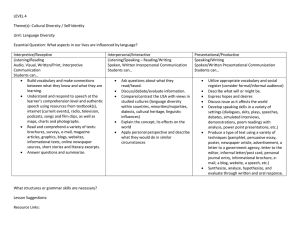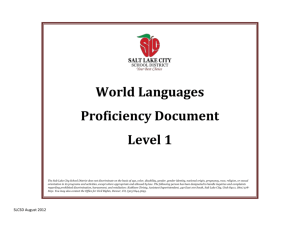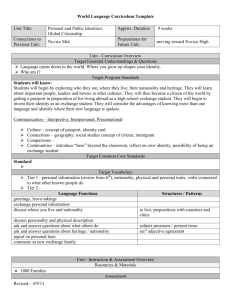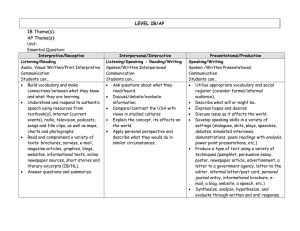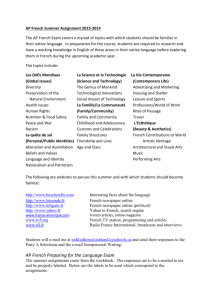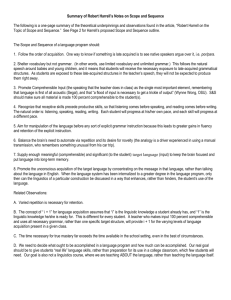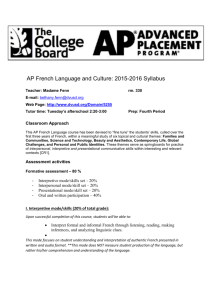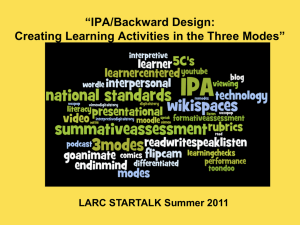Level 2 Proficiency Document
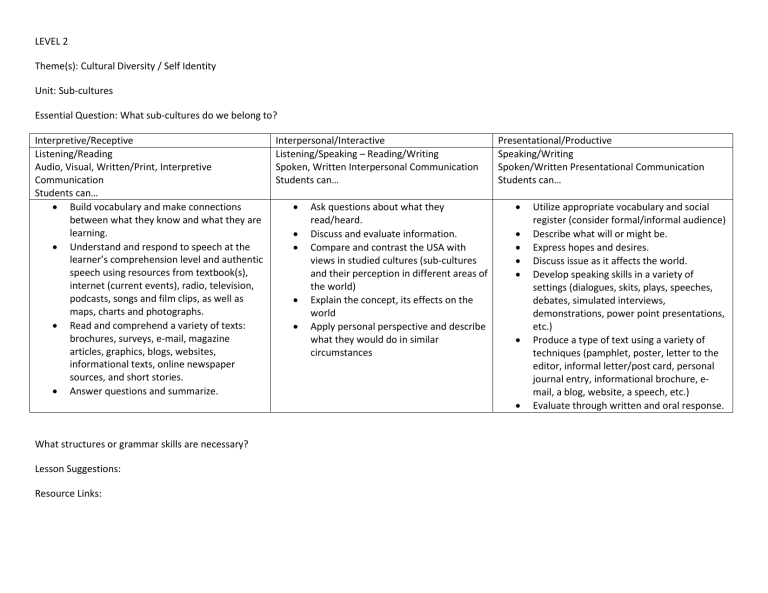
LEVEL 2
Theme(s): Cultural Diversity / Self Identity
Unit: Sub-cultures
Essential Question: What sub-cultures do we belong to?
Interpretive/Receptive
Listening/Reading
Audio, Visual, Written/Print, Interpretive
Communication
Students can…
Build vocabulary and make connections between what they know and what they are learning.
Understand and respond to speech at the learner’s comprehension level and authentic speech using resources from textbook(s), internet (current events), radio, television, podcasts, songs and film clips, as well as maps, charts and photographs.
Read and comprehend a variety of texts: brochures, surveys, e-mail, magazine articles, graphics, blogs, websites, informational texts, online newspaper sources, and short stories.
Answer questions and summarize.
Interpersonal/Interactive
Listening/Speaking – Reading/Writing
Spoken, Written Interpersonal Communication
Students can…
Ask questions about what they read/heard.
Discuss and evaluate information.
Compare and contrast the USA with views in studied cultures (sub-cultures and their perception in different areas of the world)
Explain the concept, its effects on the world
Apply personal perspective and describe what they would do in similar circumstances
Presentational/Productive
Speaking/Writing
Spoken/Written Presentational Communication
Students can…
Utilize appropriate vocabulary and social register (consider formal/informal audience)
Describe what will or might be.
Express hopes and desires.
Discuss issue as it affects the world.
Develop speaking skills in a variety of settings (dialogues, skits, plays, speeches, debates, simulated interviews, demonstrations, power point presentations, etc.)
Produce a type of text using a variety of techniques (pamphlet, poster, letter to the editor, informal letter/post card, personal journal entry, informational brochure, email, a blog, website, a speech, etc.)
Evaluate through written and oral response.
What structures or grammar skills are necessary?
Lesson Suggestions:
Resource Links:
LEVEL 2
Theme(s): Family and Community
Unit: Family Structures
Essential Question: How do our family structures influence our lives?
Interpretive/Receptive
Listening/Reading
Audio, Visual, Written/Print, Interpretive
Communication
Students can…
Build vocabulary and make connections between what they know and what they are learning.
Understand and respond to speech at the learner’s comprehension level and authentic speech using resources from textbook(s), internet (current events), radio, television, podcasts, songs and film clips, as well as maps, charts and photographs.
Read and comprehend a variety of texts: brochures, surveys, e-mail, magazine articles, graphics, blogs, websites, informational texts, online newspaper sources, short stories and literary excerpts.
Answer questions and summarize.
Interpersonal/Interactive
Listening/Speaking – Reading/Writing
Spoken, Written Interpersonal Communication
Students can…
Ask questions about what they read/heard.
Discuss and evaluate information.
Compare/contrast the USA with views in studied cultures (family relations including extended family, roles in the family, chores, responsibilities, living arrangements, education)
Explain the concept, its effects on the
world
Apply personal perspective and describe what they would do in similar circumstances
Presentational/Productive
Speaking/Writing
Spoken/Written Presentational Communication
Students can…
Utilize appropriate vocabulary and social register (consider formal/informal audience)
Describe what will or might be.
Express hopes and desires
Discuss issue as it affects our lives
Develop speaking skills in a variety of settings (dialogues, skits, plays, simulated interviews, demonstrations, power point presentations, etc.)
Produce a type of text using a variety of techniques (pamphlet, poster, newspaper article, informal letter/post card, personal journal entry, informational brochure, email, a blog, website, etc.)
Evaluate through written and oral response.
What structures or grammar skills are necessary?
Lesson Suggestions:
Resource Links:
LEVEL 2
Theme(s): Leisure
Unit: Travel
Essential Question: How can traveling reshape our world view?
Interpretive/Receptive
Listening/Reading
Audio, Visual, Written/Print, Interpretive
Communication
Students can…
Build vocabulary and make connections between what they know and what they are learning.
Understand and respond to speech at the learner’s comprehension level and authentic speech using resources from textbook(s), internet (current events), radio, television, podcasts, songs and film clips, as well as maps, charts and photographs.
Read and comprehend a variety of texts: brochures, surveys, e-mail, magazine articles, graphics, blogs, websites, informational texts, online newspaper sources, short stories and literary excerpts.
Answer questions and summarize.
Interpersonal/Interactive
Listening/Speaking – Reading/Writing
Spoken, Written Interpersonal Communication
Students can…
Ask questions about what they read/heard.
Discuss and evaluate information.
Compare/contrast the USA with views in studied cultures (countries, languages, geographical features, transportation devices, travel experiences)
Apply personal perspective and describe what they would do in similar circumstances
Presentational/Productive
Speaking/Writing
Spoken/Written Presentational Communication
Students can…
Utilize appropriate vocabulary and social register (consider formal/informal audience)
Describe what will or might be.
Express hopes and desires
Discuss issue as it affects students personally
Develop speaking skills in a variety of settings (dialogues, skits, plays, debates, simulated interviews, demonstrations, power point presentations, etc.)
Produce a type of text using a variety of techniques (pamphlet, poster, newspaper article, advertisement, informal letter/post card, personal journal entry, informational brochure, e-mail, a blog, website, etc.)
Analyze and evaluate through written and oral response.
What structures or grammar skills are necessary?
Lesson Suggestions:
Resource Links:
LEVEL 2
Theme(s): Communication and Media
Unit: Television and Film
Essential Question: How does TV and film influence our world?
Interpretive/Receptive
Listening/Reading
Audio, Visual, Written/Print, Interpretive
Communication
Students can…
Build vocabulary and make connections between what they know and what they are learning.
Understand and respond to speech at the learner’s comprehension level and authentic speech using resources from textbook(s), internet (current events), radio, television, podcasts, songs and film clips, as well as maps, charts and photographs.
Read and comprehend a variety of texts: brochures, surveys, e-mail, magazine articles, graphics, blogs, websites, informational texts, online newspaper sources, short stories and literary excerpts.
Answer questions and summarize.
Interpersonal/Interactive
Listening/Speaking – Reading/Writing
Spoken, Written Interpersonal Communication
Students can…
Ask questions about what they read/heard.
Discuss and evaluate information.
Compare/contrast the USA with views in studied cultures (TV and film vocabulary, advertising, news, media messages)
Explain the concept, its effects on the world
Apply personal perspective and describe what they would do in similar circumstances
Presentational/Productive
Speaking/Writing
Spoken/Written Presentational Communication
Students can…
Utilize appropriate vocabulary and social register (consider formal/informal audience)
Describe what will or might be.
Express hopes and desires
Discuss issue as it affects students personally and the world
Develop speaking skills in a variety of settings (dialogues, skits, plays, simulated interviews, demonstrations, power point presentations, etc.)
Produce a type of text using a variety of techniques (pamphlet, poster, newspaper article, advertisement, a letter to a government agency, letter to the editor, informal letter/post card, personal journal entry, informational brochure, e-mail, a blog, website, etc.)
Analyze and evaluate through written and oral response.
What structures or grammar skills are necessary?
Lesson Suggestions:
Resource Links:
LEVEL 2
Theme(s): Health
Unit: Medicine and well-being
Essential Question: How do different cultures deal with illnesses?
Interpretive/Receptive
Listening/Reading
Audio, Visual, Written/Print, Interpretive
Communication
Students can…
Build vocabulary and make connections between what they know and what they are learning.
Understand and respond to speech at the learner’s comprehension level and authentic speech using resources from textbook(s), internet (current events), radio, television, podcasts, songs and film clips, as well as maps, charts and photographs.
Read and comprehend a variety of texts: brochures, surveys, e-mail, magazine articles, graphics, blogs, websites, informational texts, online newspaper sources, short stories and literary excerpts.
Answer questions and summarize.
Interpersonal/Interactive
Listening/Speaking – Reading/Writing
Spoken, Written Interpersonal Communication
Students can…
Ask questions about what they read/heard.
Discuss and evaluate information.
Compare/contrast the USA with views in studied cultures (words to describe the body and illnesses, doctor and hospital vocabulary, home remedies, healthy lifestyle, exercise)
Explain the concept, its effects on the
world
Apply personal perspective and describe what they would do in similar circumstances
Presentational/Productive
Speaking/Writing
Spoken/Written Presentational Communication
Students can…
Utilize appropriate vocabulary and social register (consider formal/informal audience)
Describe what will or might be.
Discuss issue as it affects the world
Develop speaking skills in a variety of settings (dialogues, skits, plays, simulated interviews, demonstrations, power point presentations, etc.)
Produce a type of text using a variety of techniques (pamphlet, poster, newspaper article, advertisement, a letter to a government agency, letter to the editor, informal letter/post card, personal journal entry, informational brochure, e-mail, a blog, website, etc.)
Analyze and evaluate through written and oral response.
What structures or grammar skills are necessary?
Lesson Suggestions:
Resource Links:
LEVEL 2
Theme(s): Science and Technology
Unit: Renewable Energy
Essential Question: How can science and technology improve our lives?
Interpretive/Receptive
Listening/Reading
Audio, Visual, Written/Print, Interpretive
Communication
Students can…
Build vocabulary and make connections between what they know and what they are learning.
Understand and respond to speech at the learner’s comprehension level and authentic speech using resources from textbook(s), internet (current events), radio, television, podcasts, songs and film clips, as well as maps, charts and photographs.
Read and comprehend a variety of texts: brochures, surveys, e-mail, magazine articles, graphics, blogs, websites, informational texts, online newspaper sources, short stories and literary excerpts.
Answer questions and summarize.
Interpersonal/Interactive
Listening/Speaking – Reading/Writing
Spoken, Written Interpersonal Communication
Students can…
Ask questions about what they read/heard.
Discuss and evaluate information.
Compare/contrast the USA with views in studied cultures (renewable energy and its effects on everyday life)
Explain the concept, its effects on the world
Apply personal perspective and describe what they would do in similar circumstances
Presentational/Productive
Speaking/Writing
Spoken/Written Presentational Communication
Students can…
Utilize appropriate vocabulary and social register (consider formal/informal audience)
Describe what will or might be.
Express hopes and desires
Discuss issue as it affects the world
Develop speaking skills in a variety of settings (dialogues, skits, plays, simulated interviews, demonstrations, power point presentations, etc.)
Produce a type of text using a variety of techniques (pamphlet, poster, newspaper article, advertisement, a letter to a government agency, letter to the editor, informal letter/post card, personal journal entry, informational brochure, e-mail, a blog, website, etc.)
Analyze, hypothesize, and evaluate through written and oral response.
What structures or grammar skills are necessary?
Lesson Suggestions:
Resource Links:
LEVEL 2
Theme(s): Customs and Traditions
Unit: Historical Events
Essential Question: How does the past influence the present?
Interpretive/Receptive
Listening/Reading
Audio, Visual, Written/Print, Interpretive
Communication
Students can…
Build vocabulary and make connections between what they know and what they are learning.
Understand and respond to speech at the learner’s comprehension level and authentic speech using resources from textbook(s), internet (current events), radio, television, podcasts, songs and film clips, as well as maps, charts and photographs.
Read and comprehend a variety of texts: brochures, surveys, e-mail, magazine articles, graphics, blogs, websites, informational texts, online newspaper sources, short stories and literary excerpts.
Answer questions and summarize.
Interpersonal/Interactive
Listening/Speaking – Reading/Writing
Spoken, Written Interpersonal Communication
Students can…
Ask questions about what they read/heard.
Discuss and evaluate information.
Compare/contrast the USA with views in studied cultures (important historical events and their present influence)
Explain the concept, its effects on the world
Apply personal perspective and describe what they would do in similar circumstances
Presentational/Productive
Speaking/Writing
Spoken/Written Presentational Communication
Students can…
Utilize appropriate vocabulary and social register (consider formal/informal audience)
Discuss issue as it affects the world
Develop speaking skills in a variety of settings (dialogues, skits, plays, simulated interviews, demonstrations, power point presentations, etc.)
Produce a type of text using a variety of techniques (pamphlet, poster, newspaper article, advertisement, a letter to a government agency, letter to the editor, informal letter/post card, personal journal entry, informational brochure, e-mail, a blog, website, etc.)
Synthesize, analyze, and evaluate through written and oral response.
What structures or grammar skills are necessary?
Lesson Suggestions:
Resource Links:
LEVEL 2
Theme(s): Global Issues
Unit: Recycling
Essential Question: What can we do to save the planet?
Interpretive/Receptive
Listening/Reading
Audio, Visual, Written/Print, Interpretive
Communication
Students can…
Build vocabulary and make connections between what they know and what they are learning.
Understand and respond to speech at the learner’s comprehension level and authentic speech using resources from textbook(s), internet (current events), radio, television, podcasts, songs and film clips, as well as maps, charts and photographs.
Read and comprehend a variety of texts: brochures, surveys, e-mail, magazine articles, graphics, blogs, websites, informational texts, online newspaper sources, short stories and literary excerpts.
Answer questions and summarize.
Interpersonal/Interactive
Listening/Speaking – Reading/Writing
Spoken, Written Interpersonal Communication
Students can…
Ask questions about what they read/heard.
Discuss and evaluate information.
Compare/contrast the USA with views in studied cultures (recycling, environmental issues, cause and effect, green living, water consumption)
Explain the concept, its effects on the world
Apply personal perspective and describe what they would do in similar circumstances
Presentational/Productive
Speaking/Writing
Spoken/Written Presentational Communication
Students can…
Utilize appropriate vocabulary and social register (consider formal/informal audience)
Describe what will or might be.
Express hopes and desires
Discuss issue as it affects the world
Develop speaking skills in a variety of settings (dialogues, skits, plays, debates, simulated interviews, demonstrations, power point presentations, etc.)
Produce a type of text using a variety of techniques (pamphlet, poster, newspaper article, advertisement, a letter to a government agency, letter to the editor, informal letter/post card, personal journal entry, informational brochure, e-mail, a blog, website, etc.)
Synthesize, analyze, hypothesize, and evaluate through written and oral response.
What structures or grammar skills are necessary?
Lesson Suggestions:
Resource Links:
